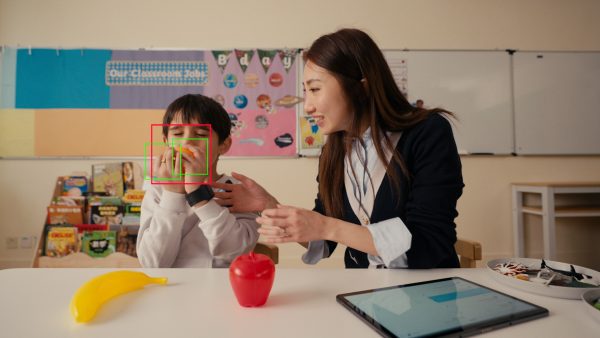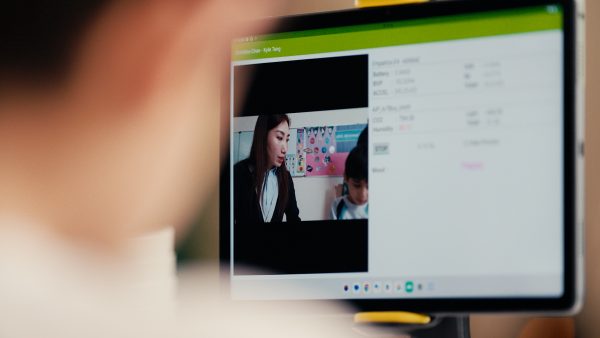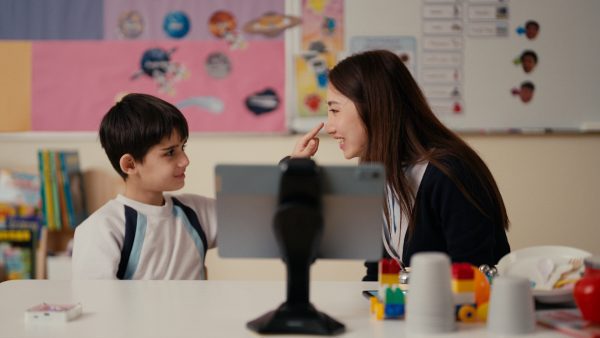There’s a global shortage of teachers with special education training. 90% of disabled students in developing countries lack access to trained teachers.[1] In Hong Kong specifically, one in every 20 children is diagnosed with autism and other disorders that fall under Special Education Needs (SEN), and the number of SEN students increased by 106% in 10 years.[2] In a world where technology continuously evolves, it could hold the potential to revolutionize education for children with special needs.
Bridging the gap
One method commonly used when working with SEN students is Applied Behavior Analysis (ABA). “ABA sessions are an important part of our roles and can be time consuming. To make them valuable we need to take lots of notes about the students’ behaviors, often over the course of three hours. The ABA methodology needs specialized training, and there aren’t enough therapists who are trained to do it. This makes it expensive and something that not every family can afford,” Christine Chan, Clinical Director at Bridge Academy outlined.
In Hong Kong, Bridge Academy, a pioneering institution that provides interventions and services for children with SEN, has turned to AI for the solution. The breakthrough, Bridge AI, is the first and only AI-powered individualized learning system in Hong Kong. This groundbreaking technology is used to help therapists, teachers and parents improve the learning and teaching experiences for SEN students cost effectively.
By capturing learning, psychological and environmental data, Bridge AI’s AI-driven solution tracks training performances and recommends Individualized Education Plans (IEP) for SEN students. This hyper automation streamlines the formerly labor-intensive ABA processes, empowering therapists to effortlessly collect performance data in real-time and select appropriate learning tasks for students.
With the application of AI technologies, such as computer visions and attention monitoring, the laborious parts of the methodology can be streamlined. This allows therapists to see more students in a day and have more meaningful interactions with them. With this highly intuitive solution, the Bridge AI team can now train university students to serve as in-classroom tutors on behalf of ABA therapists. This innovative approach allows more experienced ABA therapists to remotely oversee and supervise these tutors, ensuring the delivery of quality support and guidance to students. It makes ABA therapy much more accessible.
Parents are already seeing benefits. “In two weeks, my son developed the ability to express himself, both verbally and with body language,” said one. “Bridge has also helped my son focus a lot better, empowered him with socialization and enabled him to discover the joy of playing.”
One step further with Lenovo
To power Bridge AI, a video and audio analytics engine was needed – this is where Lenovo came in. Lenovo is working with Bridge AI to train AI models to recognise human gestures and expressions, objects and voices, and to hyperautomate grading and recommended follow-ups based on ABA domain specific language models, all to help therapists who work with children with SEN.
The model was trained on thousands of hours of footage where it learnt to identify objects and behaviors. For example, when using a camera in the classroom, AI can identify objects and track body movements. It can recognize whether a student has successfully completed a task or not and offer the therapist guidance on how to respond based on ABA methodology. It also has eye tracking technology to monitor attention and focus.
“The partnership between Bridge AI and Lenovo is driven by a shared commitment to leveraging technology for the betterment of society. Using AI, we’re already seeing how we can enhance the educational experience of students with SEN, empowering them to reach their full potential,” said Victor Wong, CEO of Bridge AI.
Ken Wong, President of Lenovo Solutions and Services Group added, “We worked closely with Bridge AI to understand its needs from the ground up and collaborated with the organization to build this incredible solution. This partnership represents a significant step forward in making quality education accessible to all children, regardless of their abilities or backgrounds”.


See Bridge AI CEO Victor Wong on stage with Lenovo’s Ken Wong at Lenovo Tech World Hong Kong
This work was made possible by bringing in Lenovo’s AI Professional Services team. This group helps businesses of all sizes navigate the AI landscape, find the right solutions, and put AI to work for their organizations quickly, cost-effectively, and at scale, bringing AI from concept to reality. AI technology has had a transformative impact on special education, and Lenovo’s insight, combined with the Bridge AI team’s specialist expertise, is helping children make breakthroughs and improving the learning experience for students with SEN.
The insights from Lenovo’s AI Professional Services team, combined with cutting-edge hardware such as AR glasses and motion tracking applications, are helping Bridge AI to enhance its AI assessment tool and improve the learning environment for students with SEN. These offerings provide educators and therapists with valuable insights and tools to personalize instruction and support individualized learning goals.
Fan Ho, Executive Director & General Manager, Asia Pacific at Lenovo Solutions and Services Group explained, “The connection that matters most is with the students’ teachers and parents. That’s what AI for All truly means. That’s why we do what we do”.


An inclusive and effective educational approach
At its core, the collaboration between Bridge AI and Lenovo represents a transformative shift in the way special education is delivered and experienced. By harnessing the power of AI technology, the organizations are not only raising the bar for educational standards but also fostering greater inclusivity and accessibility in learning environments worldwide.
“Ultimately, I hope my son’s teachers, and the people he calls friends at Bridge, will teach him how to be a caring, sincere, sensible, proper, honest and good person. Someone that will bring stability and joy to people around him,” concluded another parent.


Plans are now underway to build an ecosystem that brings together various stakeholders from the SEN community to leverage the power of technology to develop accessible and inclusive solutions. By empowering individuals with disabilities and special needs, Bridge AI hopes to enable them to lead more independent and fulfilling lives, with equitable access to high quality education and social integration.
Find out more about Lenovo Tech World Hong Kong here
LENOVO is a trademark of Lenovo.
[1] https://www.ncbi.nlm.nih.gov/books/NBK554622/
[2] Research Office of Hong Kong Legislative Council Secretariat
